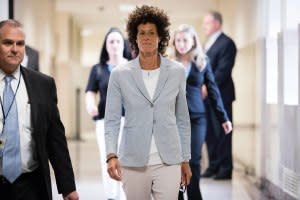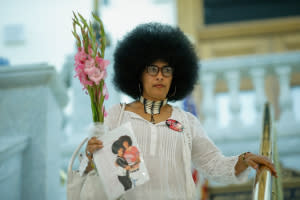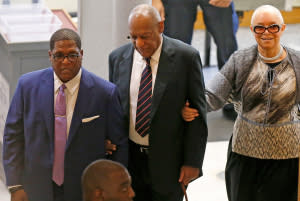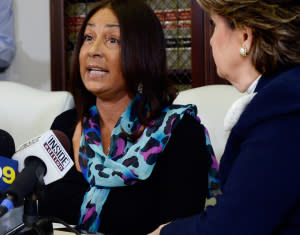Judge Declares Mistrial in Bill Cosby Sexual Assault Case After Jury Says They Are 'Hopelessly Deadlocked'
On Saturday, a Pennsylvania judge granted a mistrial after the jury had announced that they were deadlocked for the second time in the trial of Bill Cosby.
The comedian is accused of drugging and sexually assaulting former Temple University employee Andrea Constand at his Elkins Park, Pennsylvania, mansion in January 2004.
The Montgomery County, Pennsylvania, jury, which was brought in from Pittsburgh, deliberated for multiple days — returning to the judge multiple times with questions and requests. On Saturday, they announced that they were “hopelessly deadlocked.” The judge granted the mistrial. After the mistrial announcement, the District Attorney said they would retry the cast against Cosby.
Cosby’s six-day trial marked the culmination of a scandal that eclipsed his career in recent years, as he has faced an ever-increasing number of similar sexual abuse allegations from dozens of women dating back decades, all of which he has denied.
The comedian, 79, was charged in 2015 with three counts of aggravated indecent assault in connection with Constand’s accusation. He pleaded not guilty to the charges, insisting their sexual contact was consensual. Constand, who is gay, said their contact was not consensual.
RELATED VIDEO: Everything to Know About the Bill Cosby Trial
While the prosecution took four and a half days to present its case against Cosby, his defense was over in six minutes, wrapping up early Monday.
Both sides then gave lengthy closing arguments.
“Why are we running from the truth of this case, this relationship?” defense attorney Brian McMonagle asked the jury during his passionate, nearly two-hour closer. “What’s happening here is wrong, and the only people who can stop it is you. … A man’s life is at stake.”


Ms. Constand “said one thing yesterday, another thing today,” McMonagle went on, referring to alleged inconsistencies in her account, which she defended in court.
“What is she going to say tomorrow?” he said. “Unless your verdict in this case is not guilty, then I can assure you tomorrow will be too late.”
Montgomery County District Attorney Kevin Steele took two hours and 15 minutes outlining why he believed Cosby’s own words should convict him.
“He has told you what he has done,” Steele said.
“Drugging someone so you can put them in a position so you can do something [sexual] to them is not romantic,” he argued. “It’s criminal. Drugs and consensual relations don’t go together. Drugs impact a person’s ability to make decisions, and that was the defendant’s goal.”
• Want to keep up with the latest crime coverage? Click here to get breaking crime news, ongoing trial coverage and details of intriguing unsolved cases in the True Crime Newsletter.
Constand, 44, spent eight hours on the stand detailing her relationship with Cosby and her version of what happened the night of the alleged assault. Her mother, Gianna Constand, also testified, as did a second Cosby accuser, Kelly Johnson. (Montgomery County Judge Steven O’Neill, who presided over the trial, barred other accusers from appearing as witnesses.)
The defense only called one witness, Sgt. Richard Schaffer of the Cheltenham Township, Pennsylvania, police and a detective on the original case, to confirm statements he took by Constand.
Cosby did not testify in his own defense, despite conflicting suggestions from him and his spokesman about whether he would do so. Judge O’Neill put Cosby under oath to make sure he was okay with this strategy.

A Criminal Case Nearly 13 Years in the Making
Constand came forward to authorities with her accusation in early 2005. But in February of that year, then-Montgomery County District Attorney Bruce L. Castor Jr. declined to prosecute Cosby, citing “insufficient credible and admissible evidence.”
Constand subsequently filed a civil suit against Cosby, which he settled with her with a confidentiality agreement in late 2006.
For years, the scandal remained largely out of public discussion. But the claims began to gain traction in October 2014, after comedian Hannibal Buress referred to Cosby as a “rapist” during a routine at a Philadelphia nightclub.
A clip of Buress’ joke went viral on social media the next day, after it was posted by Philadelphia Magazine. When Cosby’s team attempted to start a funny meme generator on Nov. 10, 2014, nearly a month later, it backfired as fans instead began posting about the assault allegations.
Barbara Bowman — who was one of a dozen “Jane Does” who came forward to support Constand in 2005 and who told her story to PEOPLE in November 2006 — then did an interview with CNN and published an op-ed in the Washington Post on Nov. 13, 2014.
More women joined her in going public with claims of sexual abuse. The list of Cosby’s accusers has since grown to more than 60, though he has repeatedly denied their accounts and was only charged in connection with Constand. (Many of the accusations were beyond the criminal statute of limitations.)
“I know people are tired of me not saying anything, but a guy doesn’t have to answer to innuendos,” he said in November 2014. “People should fact-check.”
His attorney Martin Singer blasted the multiplying allegations as “people coming out of the woodwork with fabricated or unsubstantiated stories,” and in a statement that November said, “These brand new claims about alleged decades-old events are becoming increasingly ridiculous.”
Still, they took a toll on Cosby’s public persona: His Netflix special was shelved, a pending NBC project was canceled and TV Land pulled The Cosby Show reruns off the air.

In July 2015, Cosby’s deposition in Constand’s civil suit, which had long been under seal, became public and showed that he admitted to giving Quaaludes to women with whom he wanted to have sex.
He said he did so consensually. However, asked in his deposition if one woman, whom he said he had sex with in 1976 after giving her Quaaludes, was able to consent to their encounter while on drugs, Cosby said, “I don’t know.”
Following the deposition’s release, Montgomery County prosecutors quietly reached out to Dolores Troiani, one of Constand’s attorneys, to see if she would cooperate if they reopened her case.
As Troiani testified at a hearing on the case in February 2016, Steele, then an assistant prosecutor, asked “if my client had the stamina to do this again.”
Cosby was charged on Dec. 30, 2015.
